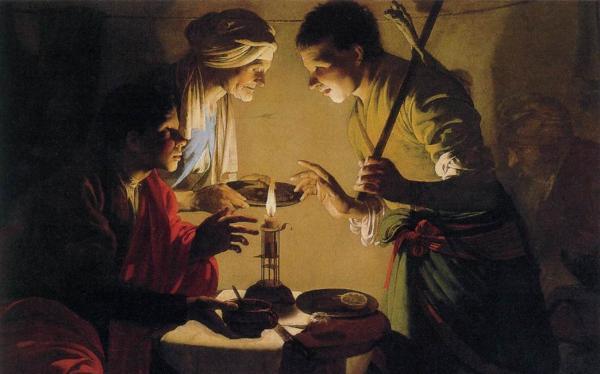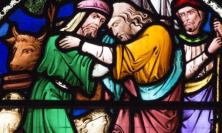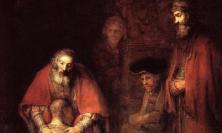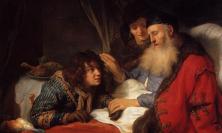The gospel reading for Sunday 10 March is the familiar story of the Prodigal Son. James Crampsey SJ suggests that if we study the fraternal relationships that are described in the Book of Genesis, we might find a new lens through which we can read this parable.
The Parable of the Prodigal Son in Luke’s Gospel is one of the best known passages in the bible, and the relationship between the two brothers in the story is one of its central themes. I would like to suggest that there are stories about brotherly relationships in the book of Genesis that may provide a fruitful context for the interpretation of the Parable of the Prodigal Son: the well-known stories of Cain and Abel, and of Joseph and his brothers; and the perhaps less familiar one of Jacob and his brother, Esau. In this article I will give a close reading of the latter story, and suggest how the reconciliation between the two brothers points forwards and backwards in the Book of Genesis, and also evokes the parable of the Prodigal Son.
Jacob and Esau (Genesis 25-33)
‘My brother Esau is an hairy man, and I am a smooth man’. These words as spoken by Alan Bennett in Beyond the Fringe probably sum up what most of us know about Esau. The words from Genesis 27:11 are Jacob’s initial objection to his mother’s scheme to obtain the blessing belonging to the first-born Esau for her favourite younger son, Jacob.
As the story of Jacob and Esau unfolds, Esau is presented as a rather dim hunter gatherer with appetites that need to be satisfied immediately, as can be seen when he exchanges his birth-right for the red stuff (mess of pottage) that Jacob has been cooking. Jacob, on the other hand, seems a bit of a mummy’s boy:
When the boys grew up, Esau was a skilful hunter, a man of the field, while Jacob was a quiet man, living in tents. Isaac loved Esau, because he was fond of game; but Rebekah loved Jacob. (Genesis 25:27-28)
Esau has a particular predilection for marrying women that will annoy his mother and his father:
When Esau was forty years old, he married Judith daughter of Beeri the Hittite, and Basemath daughter of Elon the Hittite and they made life bitter for Isaac and Rebekah. (26:34-35)
However, it is this very circumstance that provides an escape for Jacob after he has fooled Isaac into giving him Esau’s blessing. The blessing is comprehensive:
‘May God give you of the dew of heaven, and of the fatness of the earth, and plenty of grain and wine. Let peoples serve you, and nations bow down to you. Be lord over your brothers, and may your mother’s sons bow down to you. Cursed be everyone who curses you, and blessed be everyone who blesses you!’ (27:28-29)
Esau’s response is poignant: ‘Have you not kept a blessing for me?’ Isaac has to tell him that he has given Jacob everything and that there is nothing left. Esau’s feelings are understandable:
Now Esau hated Jacob because of the blessing with which his father had blessed him, and Esau said to himself, ‘The days of mourning for my father are approaching; then I will kill my brother Jacob.’ (27:41)
Rebekah gets wind of this and convinces Isaac to send Jacob to her relatives to find a wife, reminding him that they do not want another Hittite daughter-in-law! Isaac is convinced and sends Jacob away.
Jacob’s adventures in the far country are set within two night experiences: the vision at Bethel of the ladder of the angels and the wrestling with the figure at the Jabbok. At the vision of Bethel, Jacob receives the divine promise:
‘Know that I am with you and will keep you wherever you go, and will bring you back to this land; for I will not leave you until I have done what I have promised you.’ (28:15)
Jacob is tricked by his father-in-law, Laban, to serve for fourteen years to secure the hand of his true love, Rachel, the younger sister of his first wife, Leah. The unloved Leah gives birth to four sons, but Rachel is barren. The sisters’ servants provide Jacob with another four sons; Leah then has two more sons and a daughter. With strong echoes of Sarah, Rachel remains childless. And despite all these births, is there still a threat to the promise? Surely God’s faithfulness to the promise must be bound up with Jacob and Rachel. And although there is a fleeting reference to the yet-to-be-born Benjamin, the birth of Joseph is the major catalyst for Jacob’s return. In words reminiscent of the flood (‘God remembered Noah’[Genesis 8:1]):
Then God remembered Rachel, and God heeded her and opened her womb. She conceived and bore a son, and said, ‘God has taken away my reproach’; and she named him Joseph, saying, ‘May the LORD add to me another son!’ When Rachel had borne Joseph, Jacob said to Laban, ‘Send me away, that I may go to my own home and country.’ (30:22-25)
Laban is not enthusiastic, but Jacob (whose name means ‘tricky’) out-foxes his wily father-in-law, having acquired Laban’s daughters, and true to character steals what is due to Laban’s sons. It is time to get out of town (again!).
Now Jacob heard that the sons of Laban were saying, ‘Jacob has taken all that was our father’s; he has gained all this wealth from what belonged to our father.’ And Jacob saw that Laban did not regard him as favourably as he did before. Then the LORD said to Jacob, ‘Return to the land of your ancestors and to your kindred, and I will be with you.’ (31:1-3)
When we remember the last words of Esau, ‘The days of mourning for my father are approaching; then I will kill my brother Jacob’, God’s promise of presence and protection needs to take concrete shape, and it does:
Jacob went on his way and the angels [malachim] of God met him; and when Jacob saw them he said, ‘This is God’s camp!’ (32:1-2)
(Remember Psalm 34: ‘the angel of the Lord is encamped around those who revere him to rescue them.’)
This encourages Jacob to send his own messengers (malachim) to Esau to announce his arrival with a hint that he is now rich, and that it might be in Esau’s interests to receive him. The messengers return, and strike fear into Jacob’s heart: Esau is coming to meet him with four hundred men. With his brain working overtime (what would someone need four hundred men for?), Jacob first splits his caravan into two in the hope that one of the two of them might escape.
With things looking bad, Jacob turns to prayer:
‘O God of my father Abraham and God of my father Isaac, O LORD who said to me, “Return to your country and to your kindred, and I will do you good,” I am not worthy of the least of all the steadfast love and all the faithfulness that you have shown to your servant, for with only my staff I crossed this Jordan; and now I have become two companies. Deliver me, please, from the hand of my brother, from the hand of Esau, for I am afraid of him; he may come and kill us all, the mothers with the children. Yet you have said, “I will surely do you good, and make your offspring as the sand of the sea, which cannot be counted because of their number.”’ (32:9-12)
After a suitably humble start, which also reminds God of his ancestry, Jacob next reminds God that it was God’s idea for him to come back here. There follows an acknowledgement that God might well have been involved in his journey from rags to riches. Jacob’s fear is that everyone will be slaughtered, which would destroy God’s own plan.
His next strategy is to divide his flocks into a series of presents for Esau, telling his servants to say that he is coming behind them. In the middle of night, he acts again:
The same night he got up and took his two wives, his two maids, and his eleven children, and crossed the ford of the Jabbok. He took them and sent them across the stream, and likewise everything that he had. (32:22-23)
Now he is alone, and without anything. He is in the same state as when he set out on the journey. The staff is not mentioned, though it would have been useful by the end of this night. Jacob encounters a figure described in the Hebrew as ‘a man’. Who or what is his mysterious opponent? Is it an angel, as is often represented in the history of art (one thinks of Epstein’s great sculpture in the Tate Britain)? Is it God? Is it Esau? Having sent away all his other impedimenta, it makes good psychological sense that Jacob is dealing with the baggage of his history with his brother. Is something being said that God is with Esau as well as with Jacob? Jacob calls the place Peniel, ‘For I have seen God face to face, and yet my life is preserved.’ (32:30)
There is a phrase in the subsequent meeting of the estranged brothers which may bear that out. Jacob, as he tries to convince Esau to accept a present from him, says: ‘for truly to see your face is like seeing the face of God.’ (33:10)
This is an astonishing saying, and Jacob explains it by saying that it is the way that Esau has received him with such magnanimity that makes the identification possible, and the preservation of his life. The nightmare of the wrestling is replaced by the loving embrace in words which evoke the prodigal son: ‘But Esau ran to meet him, and embraced him, and fell on his neck and kissed him, and they wept.’ (33:4)
Another important element in the night of wrestling is the re-naming of Jacob as Israel. This may help to move beyond his stereotyped identity as the trickster, which had been specifically spoken by an embittered Esau: ‘Is he not rightly named Jacob? For he has supplanted me these two times. He took away my birthright; and look, now he has taken away my blessing.’ (27:36)
The transformation of Esau is astonishing. His benevolence towards Jacob is generous. He wants nothing of Jacob’s, no restitution. In fact Jacob has to use all his rhetorical skills to make him accept anything. In a strange way, as the story comes to an end, Esau is still being generous, while Jacob is still trying to get away.
So how does the relationship between Jacob and Esau compare with other fraternal relationships?
Cain and Abel (Genesis 4:1-16)
O, my offence is rank it smells to heaven;
It hath the primal eldest curse upon’t,
A brother’s murder.
(Hamlet, Act III Scene iii)
These words of Hamlet’s uncle, King Claudius reflect well the horror of the murder of Abel by Cain in the early chapters of the primeval narrative. Abel is no trickster like Jacob, but when God for no apparent reason accepts Abel’s gifts and rejects Cain’s, Cain resents Abel. Even if there was no trick, it is still not fair. God speaks to the elder son; in fact there are two conversations. The second one contains the famous line, ‘Am I my brother’s keeper?’ and is beautifully illustrated in the Cathedral of Autun in a decorated capital. It depicts God asking Cain where Abel is, and as Cain blusters his reply, you can see Abel’s feet sticking out from the grass, and when you walk round the corner you see the rest of his body.
It is the first conversation that is more interesting:
The LORD said to Cain, ‘Why are you angry, and why has your countenance fallen? If you do well, will you not be accepted? And if you do not do well, sin is lurking at the door; its desire is for you, but you must master it.’ (Genesis 4:6-7)
God puts the options starkly to Cain: Will you allow yourself to be eaten up by sin or will you master it? Some years ago Howard Cooper pointed out that the word for ‘master’ was a cognate of the word mashal, which lies behind the familiar word parable.[1] Effectively, what is being said here is that Cain must re-tell his own narrative to free himself from the likelihood of being possessed by the story he has already told himself and obsessed about.[2]
Joseph and his brothers (Genesis 37-50)
The spectre of fraternal murder hovers over the Joseph section of the book of Genesis. The coat of many colours has been interpreted as Jacob’s public declaration of Joseph as his heir, even though he is the youngest of eleven brothers. The brothers’ seething animosity towards Joseph increases as the dreamer, rather naively, tells them of his dream about the sheaves of corn. Then he has a second dream in which the sun and moon and eleven stars are bowing down to him. Jacob rebukes him for this but keeps it in his mind; the brothers are consumed by envy. Their chance comes when Joseph is sent out to them as they pasture their sheep.
They saw him from a distance, and before he came near to them, they conspired to kill him. They said to one another,
‘Here comes this dreamer. Come now, let us kill him and throw him into one of the pits; then we shall say that a wild animal has devoured him, and we shall see what will become of his dreams.’ (Genesis 37:18-20)
Reuben persuades them to put him in a pit but not kill him, as he intends to rescue him later. But while Reuben is out of the picture, the other brothers sell him to the Midianites. Joseph is taken to Egypt as a slave, while his brothers return with the blood-dipped garment to a distraught Jacob.
Passing over the wonderfully told story of Joseph in Egypt, it is worth going to the end. This is not the place to discuss whether the whole of the Joseph story is a Ringkomposition , but it is certainly the case that the final story balances out the first story, and there is an echo of the Jacob/Esau narrative as well.
After he had buried his father, Joseph returned to Egypt with his brothers and all who had gone up with him to bury his father. Realizing that their father was dead, Joseph’s brothers said, ‘What if Joseph still bears a grudge against us and pays us back in full for all the wrong that we did to him?’ So they approached Joseph, saying, ‘Your father gave this instruction before he died, “Say to Joseph: I beg you, forgive the crime of your brothers and the wrong they did in harming you.” Now therefore please forgive the crime of the servants of the God of your father.’ Joseph wept when they spoke to him. Then his brothers also wept, fell down before him, and said, ‘We are here as your slaves.’ But Joseph said to them, ‘Do not be afraid! Am I in the place of God? Even though you intended to do harm to me, God intended it for good, in order to preserve a numerous people, as he is doing today. So have no fear; I myself will provide for you and your little ones.’ In this way he reassured them, speaking kindly to them. (50:14-21)
As Esau had promised himself revenge when Isaac died, so the brothers think that Joseph will do. They manufacture a word of Jacob to persuade Joseph to re-write his narrative. But like Esau, Joseph has already freed himself from the need for vengeance. And despite his disclaimer about being in the place of God, Joseph aligns himself with God’s plan ‘to preserve a numerous people’,and says, ‘I myself will provide for you and your little ones’.
God’s promise is fulfilled by Joseph’s refusal to take vengeance on his brothers, by Esau’s magnanimity toward Jacob. The curse of Cain is not inexorably written into the script of the people of Israel.
The Prodigal Son (Luke 15: 11-32)
‘The Prodigal Son’is the most used title for this parable which only appears in Luke’s Gospel. In the gospel itself, the parable does not have a title. Its opening line is, ‘A man had two sons’. It is the third in a series of parables; the other two have similar beginnings: ‘What if a man had a hundred sheep?’; ‘What if a woman had ten drachmas?’Each parable proceeds by telling us of a loss: one sheep is lost, one coin is lost, one son is lost. Each parable tells us of a searching: the shepherd leaves the 99; the woman turns the house upside down; the father sees the prodigal while he is a long way off and there is at least a suggestion that he is out looking for him. The totality of what is broken has been restored. There is a call for celebration: the sheep are one hundred again; the coins are ten again; the two sons are back together again – but they are not, for the elder one refuses the reconciliation. As in the story of Cain and Abel, where God goes out to Cain and challenges him to retell his story, so the father of the two sons goes out to the firstborn, and offers him the words which give an alternative account of the experience:
‘But when this son of yours came back, who has devoured your property with prostitutes, you killed the fatted calf for him!’ Then the father said to him, ‘Son, you are always with me, and all that is mine is yours. But we had to celebrate and rejoice, because this brother of yours was dead and has come to life; he was lost and has been found.’ (Luke 15:30-32)
Notice how the elder brother says, ‘this son of yours’and how the father says, ‘this brother of yours’. The firstborn denies his relationship to his brother, but the father calls him to remember it: ‘This brother of yours….. was lost and has been found’. He is acting as though he has lost something, when he has found something.
How unlike Esau is the elder brother in the parable! He is more like Cain; sin is crouching at the door ready to overcome him. Fratricide remains a possibility. What happens when the father dies?
The parable has an open-ended character. What is happening in our unreconciled family relationships, particularly our sibling relationships? It is perhaps worth noting that once there are children, the fathers (but not always the mothers, since Rebekah is particularly active) recede. From the birth of Cain, Adam is a nobody. As Eve says, ‘I have produced a man with the help of the LORD.’ (Genesis 4:1)Isaac is particularly feeble, though his experience of his father Abraham with the knife might have something to do with it. Jacob is only a shadow of his former self in the long story of Joseph and his brothers. Perhaps the death of Rachel in giving birth to Benjamin, compounded by the apparent death of Joseph, diminished him.
I would suggest that the murder of Abel is redeemed by the transformation of Esau and his reconciliation with Jacob. This allows the sons of Jacob to grow up in the land of the promise, and even if they mimic the fratricide of Abel with what they plan for Joseph, the spectre of retaliatory homicide at the death of Jacob is removed by the magnanimity of Joseph. It is in refusing the temptation to fratricide that Esau and Joseph are god-like, are in the image and likeness of God, and allow God’s plan to take root. It is almost as though the first verses of the book of Exodus are the conclusion to the book of Genesis:
These are the names of the sons of Israel who came to Egypt with Jacob, each with his household: Reuben, Simeon, Levi, and Judah, Issachar, Zebulun, and Benjamin, Dan and Naphtali, Gad and Asher. The total number of people born to Jacob was seventy. Joseph was already in Egypt. Then Joseph died, and all his brothers, and that whole generation. But the Israelites were fruitful and prolific; they multiplied and grew exceedingly strong, so that the land was filled with them. (Exodus 1:1-7)
I would also suggest that these stories of brothers in the book of Genesis may be a fruitful context for the interpretation of the Prodigal Son. And is there anything to think about soteriologically when reconciliation with the brother is more challenging than reconciliation with the father? Do the reconciliatory actions of Esau and Joseph somehow reflect the face of God? It is worth remembering that it is God who protects Cain from vengeful homicide.
And the LORD put a mark on Cain, so that no one who came upon him would kill him.(4:15)
James Crampsey SJ is the Director of the Lauriston Jesuit Centre in Edinburgh.
[1] Howard Cooper, ‘Sin in biblical and rabbinic thought,’ The Month, 1993, p. 349.
[2] There is an interesting treatment of Cain and Abel in Miroslav Volf, Exclusion & Embrace (Abingdon: 1996), pp. 92-98.






